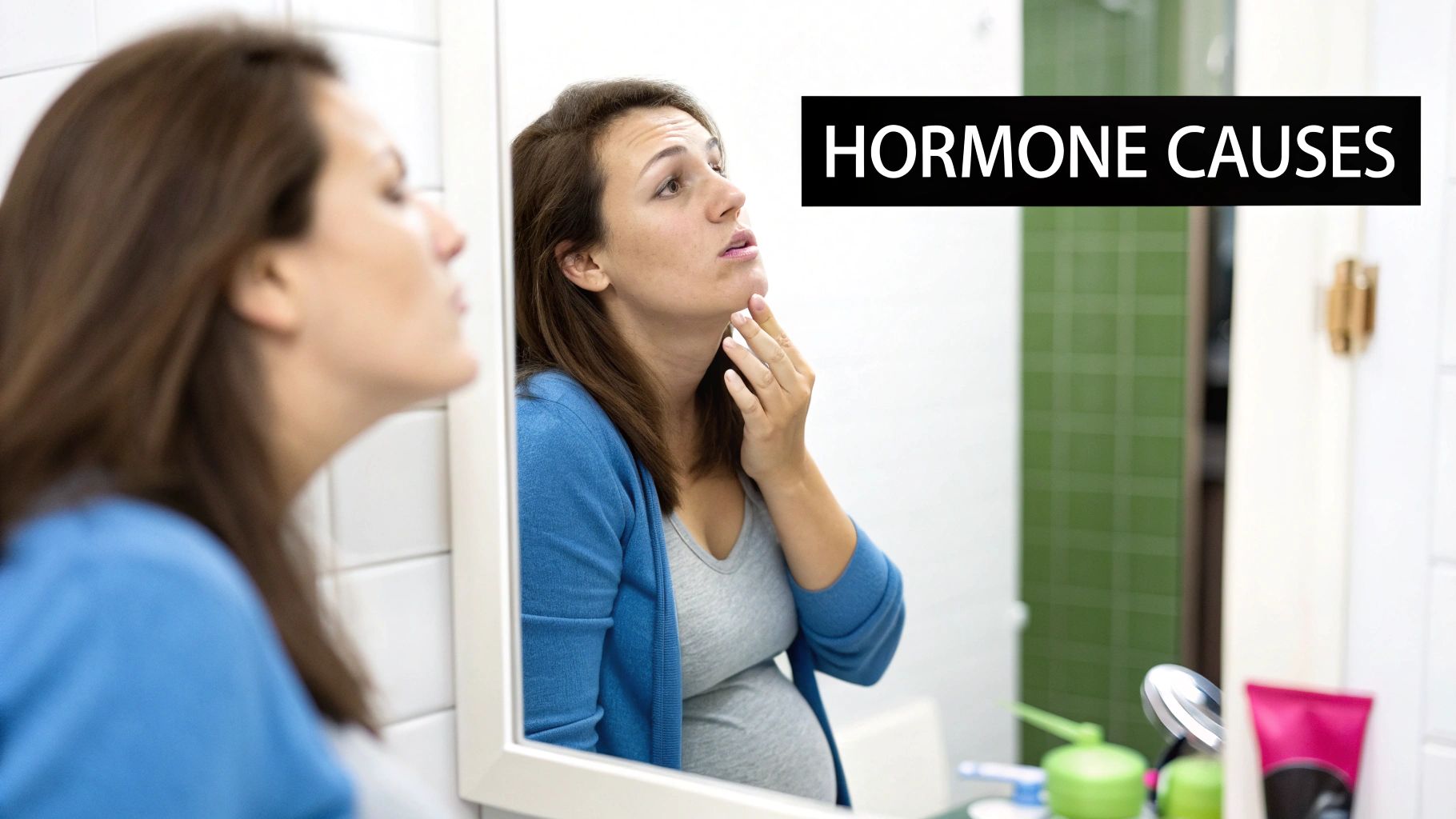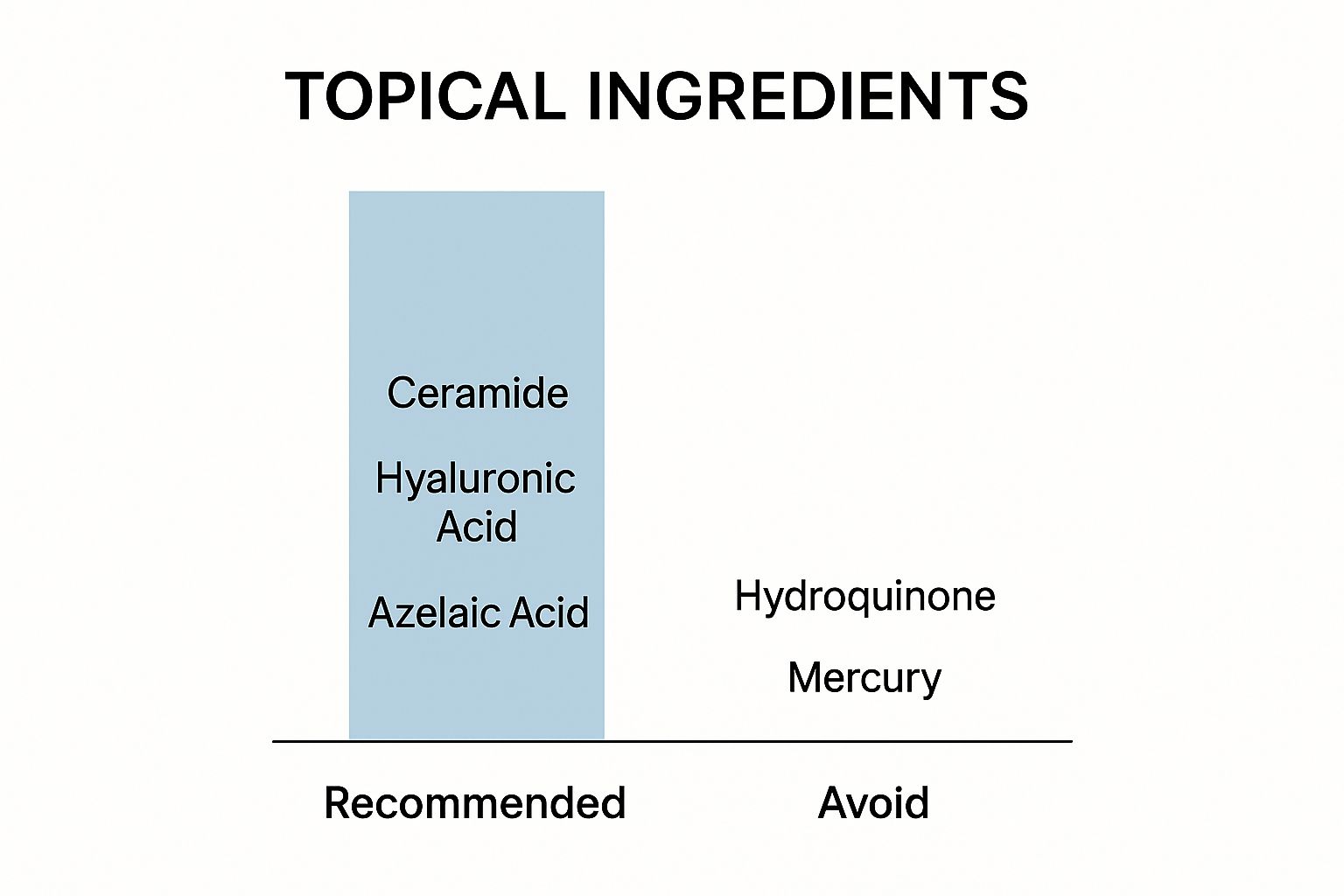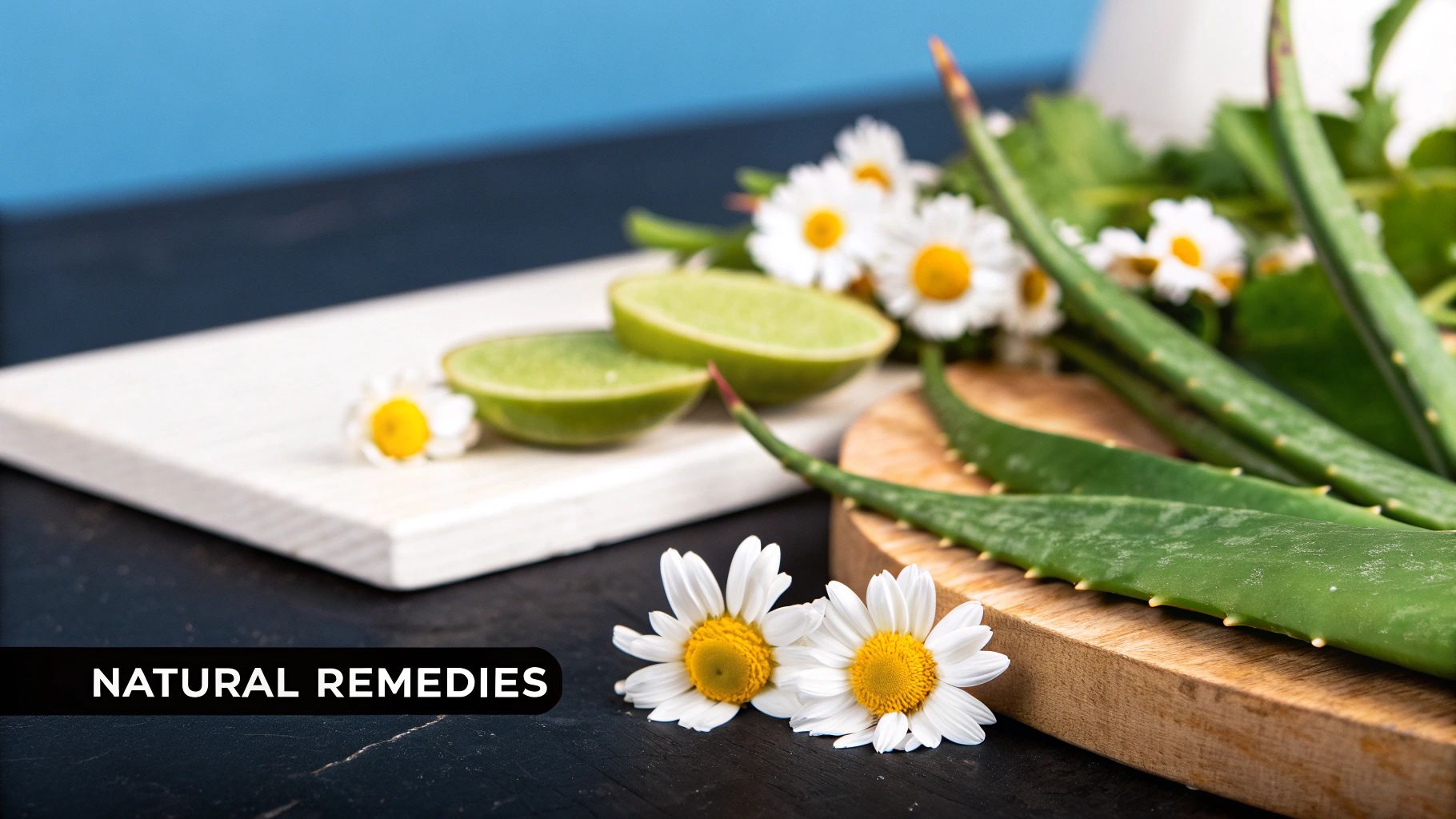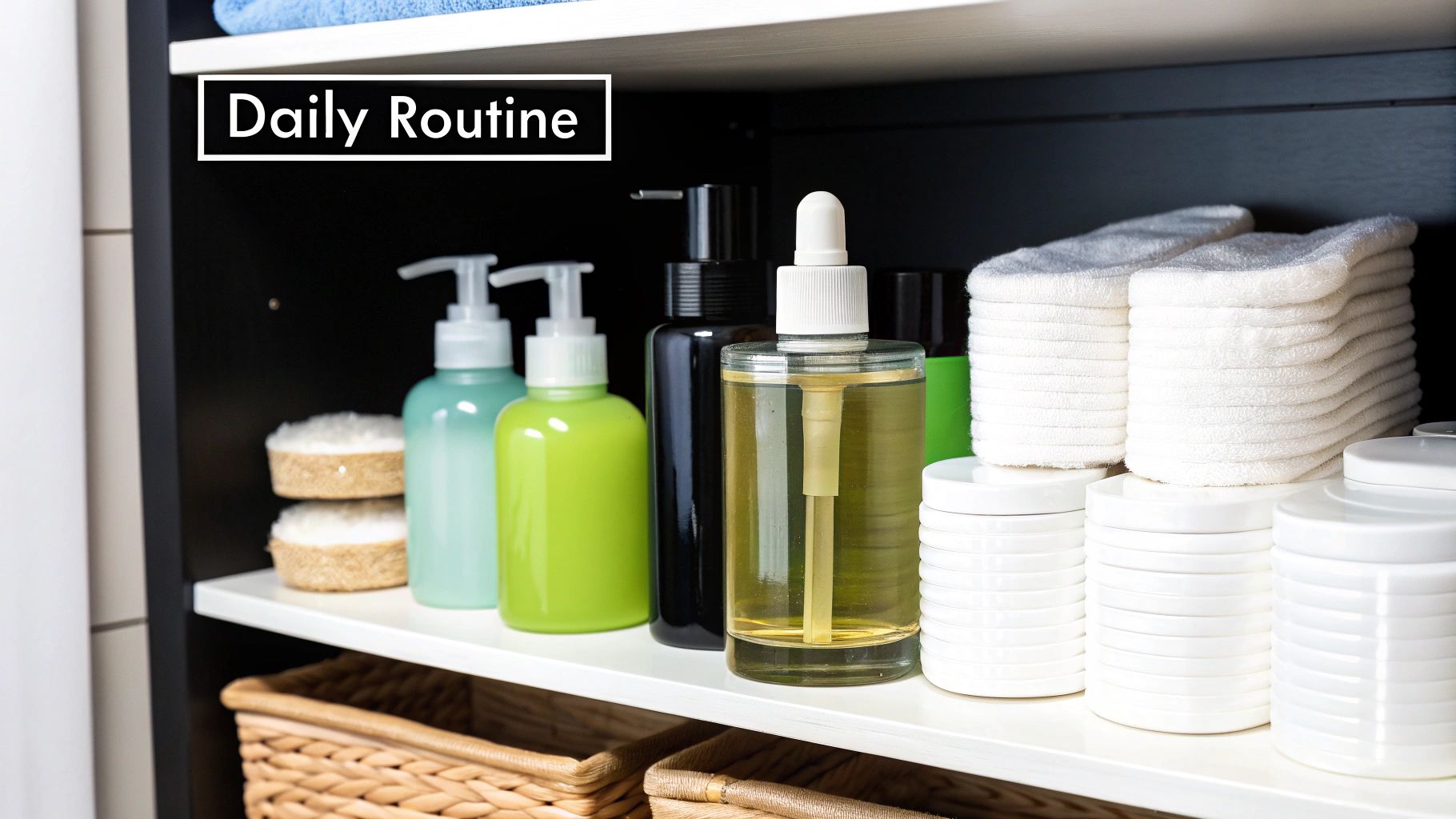Safe Acne Treatment During Pregnancy Guide

Dealing with breakouts is frustrating enough, but when you're pregnant, finding a safe and effective treatment can feel like a whole new challenge. The good news? It's completely achievable. The secret is understanding what causes these flare-ups—usually, a surge in hormones—and knowing how to manage your skin with ingredients that are both gentle and powerful.
Why Does Pregnancy Cause Acne?

If you're suddenly battling blemishes when your skin was clear before, you're not alone. For many expecting mothers, a changing complexion is one of the first surprises of pregnancy. The "why" behind it all comes down to the incredible hormonal shifts happening inside your body.
These changes are crucial for your baby's development, but they can have some frustrating side effects on your skin. Once you understand the root cause, you can build a routine that's gentle, effective, and perfectly safe for this special time.
Hormones and Your Skin
During your first trimester especially, your body ramps up the production of hormones like androgens. These hormones signal your sebaceous glands to produce more sebum, or oil.
While some oil is essential for keeping your skin hydrated, an excess can easily clog pores. When this excess oil mixes with dead skin cells, it creates the perfect environment for bacteria to multiply, leading to inflammation and breakouts. This is also why you might see acne pop up on your chest and back, not just your face.
This isn't just anecdotal; it's a well-documented medical reality. Acne vulgaris is one of the most common skin conditions affecting pregnant women. Researchers have found that hormonal shifts throughout pregnancy can either trigger breakouts or, for some, even improve them. You can dive deeper into the full research about these pregnancy-related findings to learn more.
Heightened Skin Sensitivity
On top of producing more oil, your skin often becomes more sensitive during pregnancy. Products that never bothered you before might suddenly cause redness or irritation. This is also tied to hormonal changes and the increased blood flow that contributes to that "pregnancy glow."
What does this mean for your routine? A gentle touch is absolutely essential. Now is not the time for harsh scrubs or aggressive treatments, as they’ll likely just make things worse.
Key Takeaway: Pregnancy acne is a biological response to hormonal changes. The best approach is a kind, consistent routine using only pregnancy-safe ingredients that work with your skin, not against it.
Knowing the 'why' makes it so much easier to choose the right products. At Neutralyze, we formulate our products around this very principle. Instead of harsh, drying chemicals, our focus is on scientifically-backed ingredients that gently exfoliate, reduce inflammation, and support your skin’s delicate barrier.
Choosing Pregnancy-Safe Acne Ingredients
Let's be honest: figuring out which skincare ingredients are safe during pregnancy can feel like a high-stakes guessing game. You're standing in the aisle, reading a tiny label, trying to protect both your skin and your baby. It can be completely overwhelming.
The key is to shift your focus. Instead of the aggressive chemicals you might have used before, the goal now is to find ingredients that are effective but gentle, working primarily on the surface of your skin without being absorbed into your bloodstream in any significant way.
Gentle Exfoliants You Can Trust
One of the best choices for an acne treatment during pregnancy is Mandelic Acid. As experts in gentle acne care, we at Neutralyze have built our entire system around this incredible ingredient. Derived from bitter almonds, this alpha-hydroxy acid (AHA) has a large molecular structure. This means it's simply too big to penetrate deeply into the skin, allowing it to provide fantastic surface-level exfoliation without the irritation often caused by other acids.
The science-backed power of Mandelic Acid is precisely why it’s the cornerstone of Neutralyze products. It expertly unclogs pores, reduces inflammation, and promotes skin renewal, making it the perfect, worry-free foundation for your pregnancy skincare routine.
Another solid option is Glycolic Acid, but with one important caveat—stick to low concentrations. It works similarly to Mandelic Acid by sloughing off dead skin cells, but its molecules are smaller, so it can penetrate a bit more. Products with less than 10% Glycolic Acid are generally considered safe, but this is definitely one to run by your doctor first.
Powerful and Pregnancy-Approved Actives
Beyond gentle exfoliation, a few other amazing ingredients can help you keep your skin clear while you're expecting. Understanding how they work is key to building an effective routine.
- Azelaic Acid: This is a true superstar. It helps kill acne-causing bacteria, calms inflammation, and can even help with the stubborn post-acne marks and melasma that often pop up during pregnancy.
- Benzoyl Peroxide: A classic acne-fighter for a reason. Topical benzoyl peroxide is considered safe in low concentrations, typically 5% or less. It works by killing bacteria and helping your pores clear out dead skin and excess oil.
- Vitamin C: Think of this as your supporting character. While it won't zap a pimple on its own, this powerful antioxidant helps reduce redness and inflammation, protects your skin from environmental stressors, and brightens your overall complexion.

This simple chart is a great reference, clearly separating the recommended topical treatments from the high-risk ingredients you should absolutely steer clear of right now.
Pregnancy-Safe vs Unsafe Acne Ingredients
To make things even easier, here's a quick-reference table to help you tell the good from the bad when you're checking those ingredient lists.
| Ingredient | Safety During Pregnancy | What It Does |
|---|---|---|
| Mandelic Acid | ✅ Safe | Gently exfoliates, unclogs pores, and reduces inflammation. |
| Azelaic Acid | ✅ Safe | Fights bacteria, reduces redness, and helps with hyperpigmentation. |
| Glycolic Acid (Low %) | ✅ Generally Safe (under 10%) | Exfoliates dead skin cells to prevent clogged pores. |
| Benzoyl Peroxide (Low %) | ✅ Generally Safe (under 5%) | Kills acne-causing bacteria deep within the pores. |
| Salicylic Acid | ⚠️ Caution (Avoid leave-ons) | An exfoliant (BHA) that penetrates oil; best to avoid in high concentrations. |
| Retinoids (All forms) | ❌ UNSAFE | Includes retinol, tretinoin, and isotretinoin. Linked to birth defects. |
| Hydroquinone | ❌ UNSAFE | A skin-lightening agent with a high absorption rate. |
This table isn't exhaustive, of course, but it covers the most common ingredients you'll encounter. When in doubt, always snap a picture of the label and send it to your doctor or dermatologist.
Ingredients to Avoid at All Costs
Knowing what not to use is just as important as knowing what's safe. Some very common and effective acne treatments pose serious risks during pregnancy and need to be put away immediately.
Retinoids are the most critical ingredient to stop using. This is non-negotiable. The category includes everything from prescription tretinoin (Retin-A) and oral isotretinoin (Accutane) to over-the-counter retinol. They have been directly linked to birth defects and must be avoided completely.
You'll also want to be very careful with Salicylic Acid. While a tiny amount in a face wash that you rinse right off might be okay, you should absolutely avoid high-concentration products like peels or leave-on treatments. It's really best to just check with your doctor before using anything with this ingredient.
Ultimately, managing breakouts during pregnancy comes down to gentle efficacy. By focusing on proven, pregnancy-safe options like Mandelic Acid, you can confidently keep your skin healthy and clear without a single worry.
How To Build A Simple And Effective Skincare Routine

Alright, you know which ingredients are safe—that's a huge relief. But how do you actually put them together into a daily practice that works? When you're pregnant, simplicity is your best friend. A fussy, 10-step routine is not only exhausting, but it can also easily irritate your already sensitive skin.
The goal here is a consistent, gentle approach that supports your skin without adding more stress to your plate. We'll focus on a core set of products to cleanse, treat, hydrate, and protect. By layering them the right way, you give each product a chance to do its job, helping you manage breakouts and keep your skin feeling good through every trimester.
Your Essential Morning Routine
Think of your morning routine as your skin's daily defense shield. Its main job is to protect you from environmental stressors and prep your skin for whatever the day holds. It should feel refreshing, not like a chore.
- Start with a Gentle Cleanse: Use a mild, non-comedogenic cleanser to wash away any oil that built up overnight. You want to feel clean without that tight, stripped feeling.
- Add a Vitamin C Serum: A pregnancy-safe Vitamin C serum is a fantastic antioxidant. It helps guard your skin against environmental damage, brightens your complexion, and can even calm down some of that acne-related inflammation.
- Hydrate, Hydrate, Hydrate: Lock everything in with a lightweight, fragrance-free moisturizer. This keeps your skin barrier happy and supple.
- Finish with Sunscreen (Always): This step is non-negotiable. Sun exposure can make both acne and melasma (the "mask of pregnancy") much worse. Use a broad-spectrum mineral sunscreen with an SPF of 30 or higher every single day, no exceptions.
Your Restorative Evening Routine
Nighttime is when your skin finally gets to rest and repair itself. Your evening routine should focus on washing away the day's grime and using targeted treatments to tackle breakouts while you sleep. This is where a safe, effective exfoliant can really make a difference.
A perfect evening routine can be built around Mandelic Acid, the pregnancy-safe AHA renowned for being both powerful and gentle. At Neutralyze, we’ve designed our Face Wash and Clearing Serum to work in harmony, leveraging this key ingredient to effectively unclog pores, reduce inflammation, and heal skin overnight without harshness.
Here’s a simple flow for the evening:
- Thoroughly Cleanse: Wash away every trace of makeup, sunscreen, and city pollution from the day.
- Treat or Exfoliate: This is where a targeted serum shines. A product like Neutralyze Clearing Serum, featuring Mandelic Acid, gently exfoliates and fights bacteria while you sleep. On alternate nights, you could use a different treatment, like one with Azelaic Acid, to give your skin consistent benefits without overdoing it.
- Moisturize Well: End with a nourishing moisturizer to support your skin's healing process overnight. Some people find great success with a natural tallow skin balm, which is packed with nutrients that support skin health.
This simple, twice-a-day structure is a powerful framework for a safe and effective acne treatment during pregnancy. It gives your skin exactly what it needs—gentle cleansing, targeted treatment, and crucial hydration—to stay as clear and healthy as possible.
Lifestyle Habits That Support Clear Skin
What you do outside of your skincare routine is just as important as what you put on your face, especially when dealing with pregnancy acne. Think of it this way: your products are treating the surface, but your daily habits are working from the inside out to keep things balanced.
You don’t have to make drastic changes overnight. Even small, consistent adjustments to your diet, stress levels, and daily habits can create a huge shift, helping to calm inflammation and prevent new breakouts before they even start.
Nourish Your Skin from Within
While pregnancy is definitely not the time for restrictive diets, you can absolutely support your skin by focusing on whole, nourishing foods. The goal here is to keep your blood sugar stable, since big spikes and crashes can trigger inflammation and ramp up oil production.
Instead of thinking about what to cut out, focus on what you can add in:
- Colorful Fruits and Veggies: They're loaded with antioxidants that are fantastic for calming down inflammation.
- Lean Proteins: These are the building blocks for healthy, resilient skin.
- Healthy Fats: Foods like avocado, nuts, and seeds help fortify your skin's natural moisture barrier.
And don't forget water! Staying hydrated is one of the simplest things you can do. It helps your body flush out toxins and keeps your skin looking plump and healthy. It's also worth understanding the balance between exercise and diet for wellness, as both play a major role in how your skin looks and feels.
Manage Stress for Calmer Skin
There's a reason you break out when you're stressed—it's not just in your head. Stress causes your body to pump out cortisol, a hormone that can throw oil production into overdrive. Finding simple, effective ways to unwind is a powerful form of acne treatment during pregnancy.
Think about weaving some gentle stress-relief into your day. Prenatal yoga can be a game-changer for both your mind and body. Even just five minutes of deep breathing or mindfulness can work wonders to bring those cortisol levels down. A simple daily walk is another great way to improve circulation and clear your head.
Key Insight: Your mental state has a direct line to your skin. Prioritizing relaxation isn't selfish—it's a critical part of your skincare plan.
Finally, a few practical habits can make a surprising difference. Try to change your pillowcase every couple of days to keep bacteria and oil from building up and transferring to your skin. Make a real effort not to touch your face throughout the day, as this is a primary way bacteria gets spread. And if you wear makeup, always check that it's labeled non-comedogenic, which just means it won't clog your pores.
When to Talk to Your Doctor About Acne

While sticking to a gentle skincare routine can do a lot for most pregnancy breakouts, sometimes you need to call in the professionals. Knowing when to look beyond your bathroom cabinet and check in with your doctor is a key part of keeping your acne treatment during pregnancy both safe and effective.
At-home care can be incredibly helpful, but it has its limits. If your acne isn't getting better after several weeks of consistent effort, or if it's actually getting worse, that's a clear signal to seek medical advice. This is particularly important if you start noticing deep, painful cysts or nodules forming under the skin.
Those stubborn blemishes don't just have a higher chance of scarring; they often signal a level of inflammation that really needs a prescription-strength (and pregnancy-safe) solution to get under control.
Signs You Need Professional Guidance
It's time to book an appointment with your OB-GYN or a dermatologist if you're experiencing any of these issues. Think of them as red flags that your acne needs a more targeted approach than over-the-counter products can offer.
- Your acne is severe or cystic. We're talking about large, painful, under-the-skin bumps that just won't come to a head.
- Over-the-counter products are failing you. You've been diligent with a pregnancy-safe routine for 6-8 weeks and are seeing zero improvement.
- The breakouts are taking a toll on your mental health. Your well-being is a top priority. If your skin is making you anxious or unhappy, that's a perfectly valid reason to ask for help.
- You think there might be an infection. The spots are unusually red, tender to the touch, or oozing.
What to Expect From Your Doctor's Visit
Don't be nervous about bringing up your acne with your doctor. They get it. They understand the hormonal rollercoaster of pregnancy and are there to find solutions that are safe for you and your baby. Most likely, they’ll talk to you about prescription topical treatments that have a proven safety record.
Research shows a few options are consistently recommended. For example, a retrospective study on the topic found that azelaic acid 15% gel and clindamycin 1% gel were the most frequently prescribed treatments, used in 75.7% and 56.8% of pregnant patients, respectively. You can read more about these common prescription choices for pregnant women to feel more prepared for your appointment.
Advocating for yourself is one of the most powerful things you can do. When you clearly explain your concerns and what you've tried, you give your doctor the information they need to find the best and safest path forward for your skin.
Your Pregnancy Acne Questions, Answered
Even with the perfect routine in place, it's completely normal to have a few lingering questions. When you're pregnant, you second-guess everything, and skincare is no exception! Let's clear up some of the most common worries I hear from expecting moms so you can feel confident and reassured.
It's interesting—and a little sad—how many women hesitate to ask for help with their skin during pregnancy, often because they're worried about the safety of treatments. A recent study highlighted this, showing that only 4.5% of pregnant women in German-speaking areas and 10.6% in Poland sought medical care for their acne. If you're curious, you can read more about patient education on this topic. It really underscores how important it is to have access to safe, reliable information.
Will My Acne Disappear After Giving Birth?
For most women, the answer is a relieving "yes." Once your baby arrives and your hormones start to level out, your skin often clears up significantly. But, and this is a big "but," the postpartum period brings its own hormonal rollercoaster. This can sometimes mean breakouts stick around for a bit longer or even pop up unexpectedly. My best advice? Stick with your gentle, consistent skincare routine after delivery to help your skin navigate that transition as smoothly as possible.
Can I Use Spot Treatments On Individual Pimples?
Absolutely, but you have to be a bit of a detective. Check the ingredients list carefully. Spot treatments with benzoyl peroxide, sulfur, or a touch of azelaic acid are your go-to options for zapping a single blemish. Just apply a tiny amount directly on the spot after you wash your face. Steer clear of any that contain salicylic acid unless your doctor has personally given you the green light.
Key Takeaway: The best defense against hormonal acne is consistent, gentle care. Stick with proven, safe ingredients like Mandelic Acid. It's a fantastic multitasker that exfoliates and reduces inflammation without irritating sensitive skin—which is exactly why it's the hero ingredient in our Neutralyze formulas and the ideal solution for pregnancy acne.
Is It Safe To Get A Facial While Pregnant?
A relaxing facial can be a wonderful treat, but communication is everything. The moment you book, tell your esthetician that you're expecting. This is non-negotiable. They'll know to avoid aggressive treatments like strong chemical peels, retinoids, or high-concentration salicylic acid.
Instead, ask for a facial that focuses on calming and safe services, such as:
- A deeply hydrating facial to replenish moisture.
- Gentle enzymatic exfoliation for a subtle glow.
- Careful, professional manual extractions if needed.
Does Morning Sickness Make My Skin Worse?
It's not a direct cause, but it can definitely have a ripple effect. Nausea and vomiting can lead to dehydration, which zaps the life out of your skin, leaving it dull and stressed. Plus, the sheer stress of feeling sick can spike inflammation and, you guessed it, trigger more breakouts. The best you can do is sip water or electrolyte drinks whenever you can and slather on a simple, soothing moisturizer to keep your skin barrier happy.
Ready to build a pregnancy-safe routine you can trust? Neutralyze harnesses the power of gentle yet effective ingredients like Mandelic Acid to help you achieve clear, calm skin. Discover your solution at https://www.neutralyze.com.